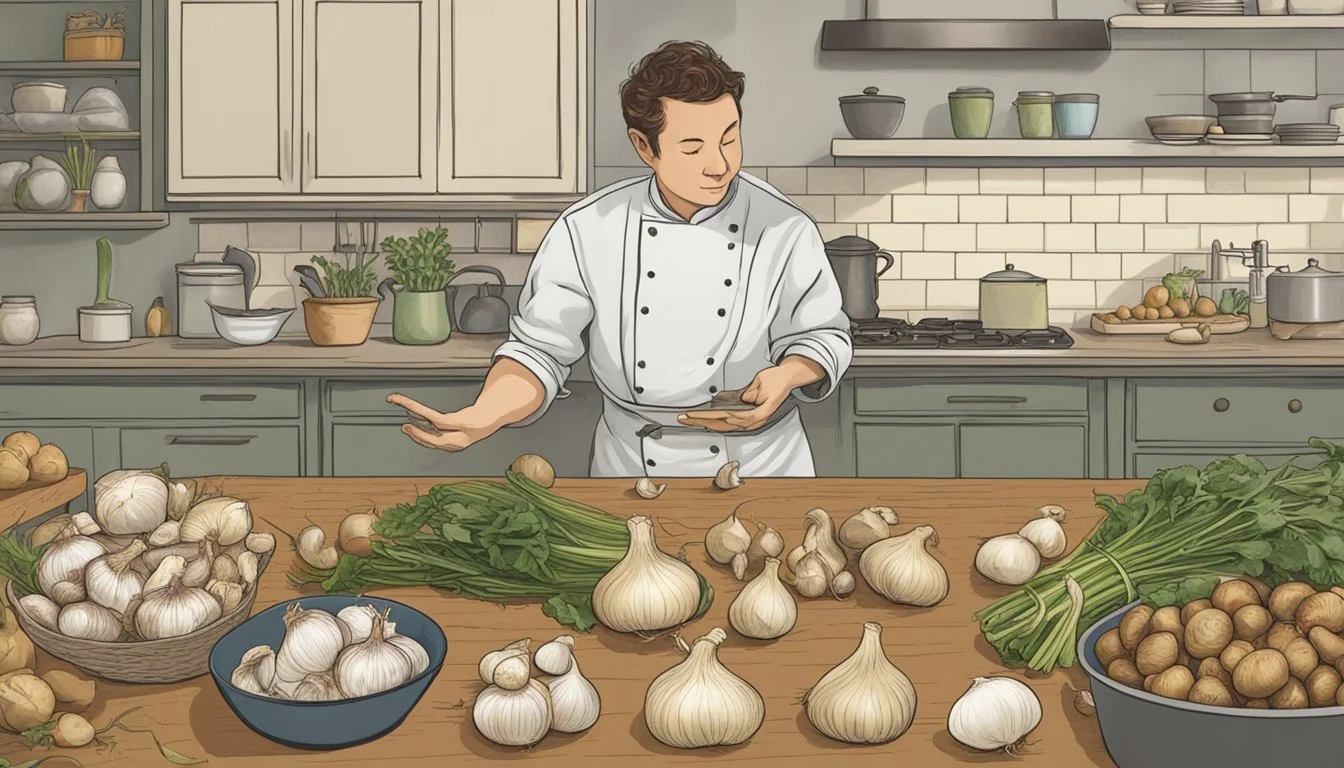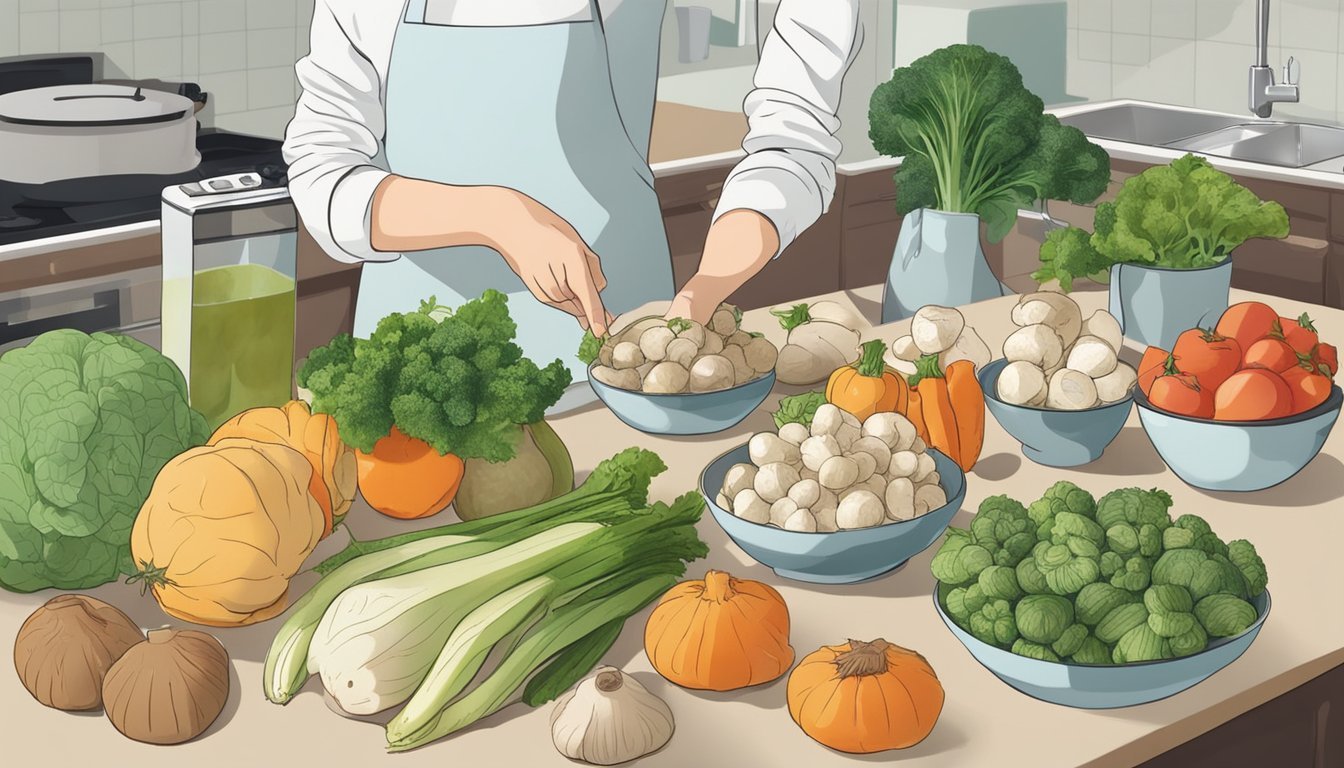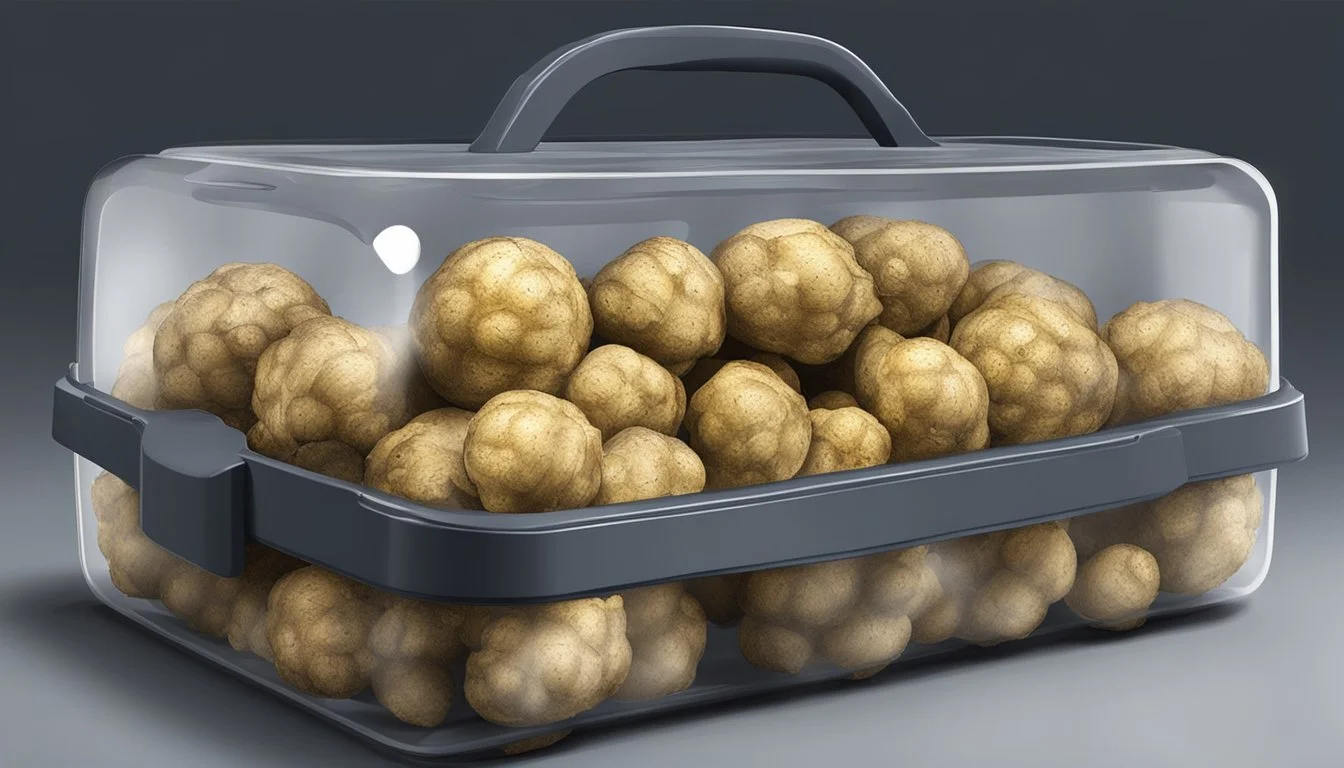Sunchokes Substitutes
Best Alternatives for Cooking and Recipes
Finding a suitable substitute for sunchokes can be a challenge, especially if you're aiming to preserve the unique flavor and texture in your dishes. Whether you're unable to find sunchokes at your local market or looking for a different taste experience, several alternatives can work well. For a similar sweet and nutty flavor, parsnips are an excellent option, as they can be roasted, pureed, or grilled.
Carrots offer a slightly sweet and earthy flavor and are versatile in both raw and cooked preparations. They also provide a comparable nutritional profile, making them a practical and accessible choice. Jicama, known for its crunchy texture and mild sweetness, stands out as another viable substitute, often found in Mexican cuisine. These substitutes ensure you won't miss out on the delicious possibilities that sunchokes bring to your recipes.
Understanding Sunchokes
Sunchokes, also known as Jerusalem artichokes, are a type of root vegetable. Despite their name, they are unrelated to artichokes and are actually a variety of sunflower.
Jerusalem artichokes are popular for their rich, nutty flavor. They have a crisp texture similar to water chestnuts when raw, but become tender and slightly sweet when cooked.
These vegetables are highly nutritious. They are a good source of dietary fiber, iron, potassium, and vitamin C. They're also rich in inulin, a type of prebiotic fiber that promotes healthy gut bacteria.
Due to their nutrient density, sunchokes can be a valuable addition to a balanced diet. They contain modest amounts of protein and are low in calories, making them suitable for various dietary preferences and needs.
Sunchokes grow underground, much like potatoes. They thrive in well-drained soil and sunny conditions. Unlike some root vegetables, they do not need to be peeled before cooking, saving time in the kitchen.
Key nutritional components in 100 grams of sunchokes include:
Nutrient Amount Fiber 2.4 g Iron 3.4 mg Potassium 429 mg Vitamin C 4 mg Protein 2 g
Understanding sunchokes helps in appreciating their versatility and nutritional benefits in cooking and diet planning. Whether roasted, pureed, or sliced raw into salads, sunchokes bring both flavor and health benefits to the table.
Sunchoke Nutritional Profile
Sunchokes, also known as Jerusalem artichokes, offer a rich nutritional profile. They are a good source of various vitamins and minerals, making them a valuable addition to the diet.
Nutritional Highlights:
Calories: Approximately 110 calories per cup (150g)
Protein: 3 grams
Carbohydrates: 26.1 grams
Fat: 0 grams
Vitamins and Minerals:
Vitamin C: Supports the immune system
Vitamin A: Essential for vision and skin health
Iron: Vital for producing red blood cells
Potassium: Helps regulate blood pressure
Magnesium: Supports muscle and nerve function
Phosphorus: Important for bone health
Calcium: Crucial for bones and teeth
Fiber Content:
Sunchokes are high in fiber, including a specific type known as inulin. Inulin acts as a prebiotic, promoting gut health and aiding in digestion.
Health Benefits:
Heart Health: The fiber and potassium content contribute to maintaining healthy blood pressure levels.
No Cholesterol: Sunchokes contain 0 cholesterol, making them heart-friendly.
Antioxidants: Provide a range of antioxidants which support overall health.
Summary of Macronutrients per 150g:
Nutrient Amount Calories 110 kcal Carbohydrates 26.1 g Protein 3 g Fat 0 g Fiber High (Inulin) Vitamin A Not specified Vitamin C Present Iron High Potassium High Magnesium High Calcium Present Phosphorus High
This nutritious root vegetable is a versatile ingredient in various dishes, offering both health benefits and culinary flexibility.
Common Uses of Sunchokes in Cooking
Sunchokes, known for their slightly nutty flavor, are versatile ingredients used in a variety of dishes. They can be roasted, incorporated into salads and soups, or used in purees to add depth and nutrition to many recipes.
As a Roasted Side Dish
Roasting sunchokes brings out their natural sweetness and nutty flavor. They can be prepared simply with olive oil, garlic, and thyme, then roasted until crispy on the outside and tender on the inside.
Cut into uniform pieces to ensure even cooking. Season lightly with salt and pepper, toss with olive oil, minced garlic, and fresh thyme. Spread on a baking sheet and roast at 400°F (200°C) for about 25-30 minutes, stirring halfway through.
Roasted sunchokes complement a wide range of main dishes, including roasted meats, fish, and poultry, serving as a hearty and flavorful side dish.
In Salads and Soups
Sunchokes add a delightful crunch and nutty taste to salads and soups. When using raw, thinly slice sunchokes to maintain their crispy texture.
In salads, they pair well with ingredients like mixed greens, citrus fruits, and nuts. For a simple salad, toss sliced sunchokes with arugula, oranges, and walnuts, and dress with a light vinaigrette.
In soups, sunchokes can be boiled and then blended to create a creamy base, or simply added in chunks to complement other vegetables. For a hearty soup, cook sunchokes with potatoes, onions, and celery, blend, and enrich with cream or milk.
Sunchokes in Purees
Pureeing sunchokes transforms them into a smooth and creamy accompaniment for main dishes. Start by boiling peeled sunchokes until tender, then puree with a splash of cream, butter, or olive oil for richness.
To enhance flavor, consider adding roasted garlic or fresh herbs like thyme or chives. The result is a luxurious, nutty puree that pairs well with grilled meats, fish, or as a sophisticated base for vegetable dishes.
This method highlights the versatility of sunchokes, allowing their unique flavor to shine while providing a comforting, creamy texture.
Selecting the Best Sunchoke Substitutes
Choosing suitable substitutes for sunchokes depends on the desired texture, flavor, and nutritional benefits. Factors such as the preparation method and the dish's intent greatly influence the most appropriate replacement.
For Texture and Consistency
Turnips can be an excellent alternative for their similar texture. When cooked, turnips offer a slightly creamy texture, akin to boiled or roasted sunchokes.
Carrots are also viable substitutes. They retain their crispness when raw, making them suitable for salads and slaws. When cooked, carrots soften yet maintain a pleasant bite which can mimic the texture of sunchokes.
Potatoes and sweet potatoes present another option, especially in mashed or pureed forms. These ingredients introduce a creamy consistency that can complement soups and stews, replicating the starchy quality found in sunchokes.
For Flavor Profiles
Parsnips can replace sunchokes thanks to their sweet and nutty flavor. They are versatile, fitting well in roasted, pureed, or grilled dishes.
Jicama offers a mild, slightly sweet flavor, ideal for raw applications like salads where sunchokes might typically feature. Its gentle flavor makes it a universal substitute across various dishes.
Ginger and pepper, although not direct substitutes, can be added to these vegetables to enhance their profiles and bring out more nuanced flavors, resembling the subtle complexity of sunchokes.
For Nutritional Value
For those focusing on health benefits, Brussels sprouts are rich in fiber and vitamin C, making them a nutritious replacement. Their robust flavor can add depth to recipes traditionally using sunchokes.
Cauliflower provides a low-calorie, high-fiber option. It is particularly beneficial in dishes that require a similar nutritional profile to sunchokes, such as soups and purees.
Carrots and turnips offer essential nutrients like vitamin A and potassium, making them not just versatile in flavor and texture but also beneficial for overall health. Adding these ingredients can help maintain the nutritional balance in dishes meant to include sunchokes.
Sunchoke Substitutes in Different Dishes
Sunchokes can be replaced by a variety of vegetables depending on the dish. Sweet potatoes, carrots, and cauliflower are some of the best alternatives due to their similar flavors and textures.
In Hearty Casseroles and Stews
In casseroles and stews, sweet potatoes and carrots make excellent substitutes for sunchokes. Their starchy and slightly sweet flavors can mimic the creamy texture of sunchokes when cooked. Cauliflower is another great option, providing a neutral flavor and added bulk.
Using these vegetables can complement hearty recipes well, such as casseroles with rice and chunks of vegetables, or rich stews simmered with herbs and seasonings. Carrots and celery also add a bit of sweetness and crunch, enhancing the depth of flavor in the dish.
For Snacking and Salads
When it comes to salads or snacking, carrots and sweet potatoes are excellent choices. Carrots can be grilled, raw, or sliced into chips for a crispy texture. Cauliflower works well raw or lightly steamed, adding a good crunch.
For a sweet and savory snack, sweet potatoes can be peeled, thinly sliced, and baked into crispy chips. In salads, they can be grilled or roasted for a caramelized flavor that adds complexity to greens and other ingredients.
In Desserts and Sweet Treats
In desserts, sweet potatoes stand out as the closest substitute due to their sweet flavor and versatility. They can be used in recipes for pies, cakes, and even puddings. When cooked, sweet potatoes become creamy and mix well with spices like cinnamon and nutmeg.
Carrots can also be adapted for desserts, particularly in carrot cakes and muffins where their natural sweetness and soft texture are desirable. Adding a sprinkle of sugar to these substitutes can enhance their flavor, making them suitable for a variety of sweet dishes.
How to Cook with Sunchoke Substitutes
Sunchoke substitutes can be prepared and cooked in various ways to bring out their best flavors. Common substitutes include carrots, potatoes, and parsnips. Methods such as boiling, roasting, and sautéing are often employed. Seasoning plays a crucial role in enhancing their natural flavors.
Preparing Substitutes
Selecting substitutes like carrots, potatoes, and parsnips involves ensuring they are fresh and firm. Start by washing them thoroughly to remove dirt. Carrots and parsnips need to be peeled and chopped into uniform pieces. Potatoes can be used with or without the peel depending on preference. Consistent size is key for even cooking.
To wash and peel:
Carrots and parsnips: Use a vegetable peeler and cut into slices or chunks.
Potatoes: Scrub under running water, peel if desired, and chop accordingly.
Cooking Methods
Cooking sunchoke substitutes can be done through several methods:
Boiling: Place chopped vegetables in a pot of salted water. Cook until crisp-tender, approximately 10-15 minutes for carrots and parsnips, and 15-20 minutes for potatoes. Drain and serve warm.
Roasting: Preheat the oven to 400°F. Spread vegetables on a baking sheet, drizzle with olive oil, and season with salt and pepper. Roast for 30-40 minutes, turning halfway through, until golden brown.
Sautéing: Heat olive oil in a skillet. Add vegetables and cook on medium heat for about 15-20 minutes, stirring occasionally. Season with salt and any preferred herbs.
Seasoning and Flavor Enhancement
Seasoning is vital for bringing out the flavors of sunchoke substitutes. Basic seasonings include:
Salt and Pepper: Essential for any cooking method.
Olive Oil: Enhances flavor and aids in cooking.
Garlic and Thyme: Provide aromatic and savory notes.
For a rich flavor, consider using butter or cream when sautéing or roasting. Adding lemon wedges to boiled vegetables can introduce a tangy finish. Nutty flavors can be enhanced with roasted nuts or seeds sprinkled before serving.
By focusing on these key aspects, cooking with sunchoke substitutes becomes a flavorful and versatile culinary experience.
Health Considerations When Using Sunchokes and Their Substitutes
Sunchokes, also known as Jerusalem artichokes, are rich in inulin, a type of fiber. This fiber promotes gut health and can help in regulating blood sugar levels. Individuals with diabetes may benefit from this. However, because inulin ferments in the digestive system, it may cause gas and bloating for some people.
When considering substitutes, carrots are a popular option. Like sunchokes, they are high in fiber, which aids in digestion. Carrots also provide vitamin A and antioxidants, beneficial for eye health and the immune system.
Another common substitute is potatoes. They offer a similar texture but are higher in starch and calories compared to sunchokes. Potatoes also contain more sodium, which might affect blood pressure in sensitive individuals. For those watching their sodium intake, sunchokes can be a better alternative.
Calories and fat content in these vegetables are generally low, making them suitable for a balanced diet. Neither sunchokes nor their substitutes significantly impact cholesterol levels, keeping them heart-friendly.
When preparing these vegetables, methods such as roasting or boiling can enhance their flavors while keeping them nutritious. Adding herbs and spices can improve taste without adding unwanted fat or sodium.
Using substitutes like turnips or parsnips can also be a good choice. These root vegetables maintain the high fiber content and are low in calories and fat, making them excellent for those seeking to manage their weight and cholesterol levels.
Practical Tips for Storage and Handling
Raw sunchokes should be handled with care to avoid bruising, which can lead to rapid spoilage.
For short-term storage, place raw sunchokes in a cool, dry, and well-ventilated area away from light.
To keep sunchokes fresh in the refrigerator, wrap them in paper towels to absorb humidity and store them in a plastic bag. Use the crisper drawer, which maintains the correct humidity level.
Ideal storage temperature: 32°F to 40°F.
Avoid storing sunchokes near ethylene-producing fruits like apples and bananas to prevent premature spoilage.
Peeling is optional. If preferred, peel just before use to retain freshness and prevent discoloration. If peeled in advance, keep them submerged in water with a little lemon juice to avoid browning.
With these simple steps, you can enjoy sunchokes at their best for longer periods.
Conclusion
Sunchokes, also known as Jerusalem artichokes, are a versatile root vegetable. They offer unique flavors and nutrients. Some substitutes provide similar tastes, textures, and nutritional benefits.
Common Substitutes:
Potatoes
Sweet Potatoes
Turnips
Parsnips
Lotus Root
Jicama
Daikon
Each substitute brings a slightly different flavor profile and texture. They can be used interchangeably in many recipes. From roasting to mashing, the options are numerous.
Key Points:
Potatoes: A common, starchy root.
Sweet Potatoes: Sweet and nutritious.
Turnips: Mild and slightly peppery.
Parsnips: Sweet and earthy.
Cassava: Starchy and neutral.
Lotus Root: Crunchy and mild.
Jicama: Crunchy with a sweet taste.
Daikon: Mild yet crisp.
They enrich dishes, providing multiple options. Thus, choosing a substitute depends on the desired flavor and texture.








